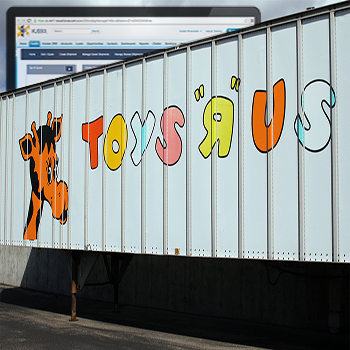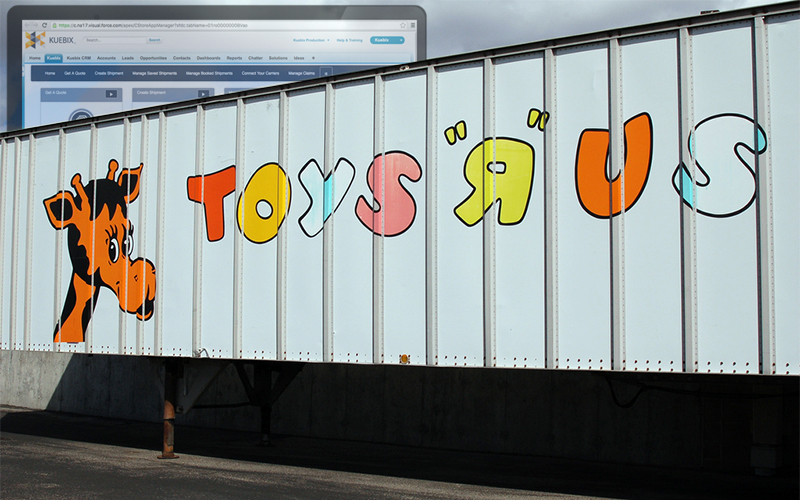For those not in the shipping business, news that Toys R Us filed for bankruptcy protection had the same effect as a surprise Gatorade bath.
For the rest of us with experience in the logistics business, this was just the latest stark reminder of the long-running battle between retailers and online sellers.
It’s next to impossible to drive in urban and suburban areas without noticing the telltale signs of the ongoing struggle.
Empty storefronts and going-out-of-business sale banners have been popping up in some of the plazas and malls I drive by on a regular basis.
Still, the Toys R Us news comes just a few months before yearend holiday shopping begins in earnest.
Many of the company’s woes are connected to it carrying billions in debt and spending hundreds of millions annually to service it.
Read: How Out-of-Stock Inventory is Killing Toys’‘R’‘Us
Learning Logistics
But another part of its predicament seems to be supply chain related.
In an extensive piece chronicling the company’s challenges in the Wall Street Journal, Toys R Us CEO Chief David Brandon reportedly said in court papers that the firm had fallen behind some competitors and cited “our inability to provide expedited shipping options, and our lack of a subscription-based delivery service.”
Logistics intelligence can play a vital role in helping retailers survive in these tough times, and thrive.
A flexible supply chain, powered by a solid transportation management system (TMS) can definitely be part of the solution for retailers looking to better compete with e-commerce companies for customers.
I’ve seen plenty in working extensively in the retail and e-commerce industries.
I’ve been asked the following question countless times over the many years since e-commerce began.
How Can a TMS Help Retailers?
- Implement technology to support business functions. The right TMS can help streamline the retailer’s supply chain. Logistics managers need visibility into their operations as well as the control to manage them in a way that knocks out inefficiencies, cuts costs and provides revenue opportunities.
- Less product in the pipeline. Once they have control and management of their transportation systems, retailers can adjust them so that they keep less product in the supply chain, which incurs reduces freight cost. The opposite – keeping more coming, is also a benefit as the predictable peak demand periods approach.
- Improve the customer experience. How many times have we heard a sales associate tell us “we don’t have any more in the back room and I don’t know when the next truck shipment is coming in?” The right TMS can allow the retailer to take control of their inbound freight by providing visibility to all deliveries, ensuring on-time deliveries and reduced freight costs.
- Quicker delivery. E-commerce companies have earned props for quickly delivering products, and rightly so. But two can play that game. By using a TMS to shorten their delivery intervals, retailers can make sure they have enough stock on hand.
- Optimize your supply chain. For this, you need a TMS with a global logistics community, which is essentially a real-time, online members-only network that connects all these parties online so they can collaborate across supply chains to find the best (sometimes fastest) and least expensive means to get cargo from origination to destination and from destination to consumers.
The Road Ahead
Investing in technology to enhance and evolve the way you do business is the way to drive your company forward from a logistics standpoint. There are TMS options that don’t require a big spend on hardware and staff, or a long, drawn-out implementation. You need a quick ROI as well as a system that gives you control, visibility and cost savings ASAP.
It’s well worth your time to check out a TMS built with the freight intelligence necessary to advance in the toughest of times. Think about that the next time you’re driving past a shopping plaza and see the sad signs.
About the Author
Dan Clark, Founder and President of Kuebix, is a transportation industry veteran. He possesses extensive operations and sales experience gained from years of working with the leading freight carriers.
Related Article: Technology Key to Addressing Driver Shortage
White Paper
Effectively Managing Big Data in Your Supply Chain
In this white paper, we’ll explain what the term “big data” means to the typical supply chain, introduce effective strategies for managing and leveraging that data, show how one grocer is using predictive analytics to harness its own big data, and explain the “first steps” that companies need to take down the path to effective management of their big data. Download Now!
Get started today with your FREE TMS Trial!

Article topics
Email Sign Up




















